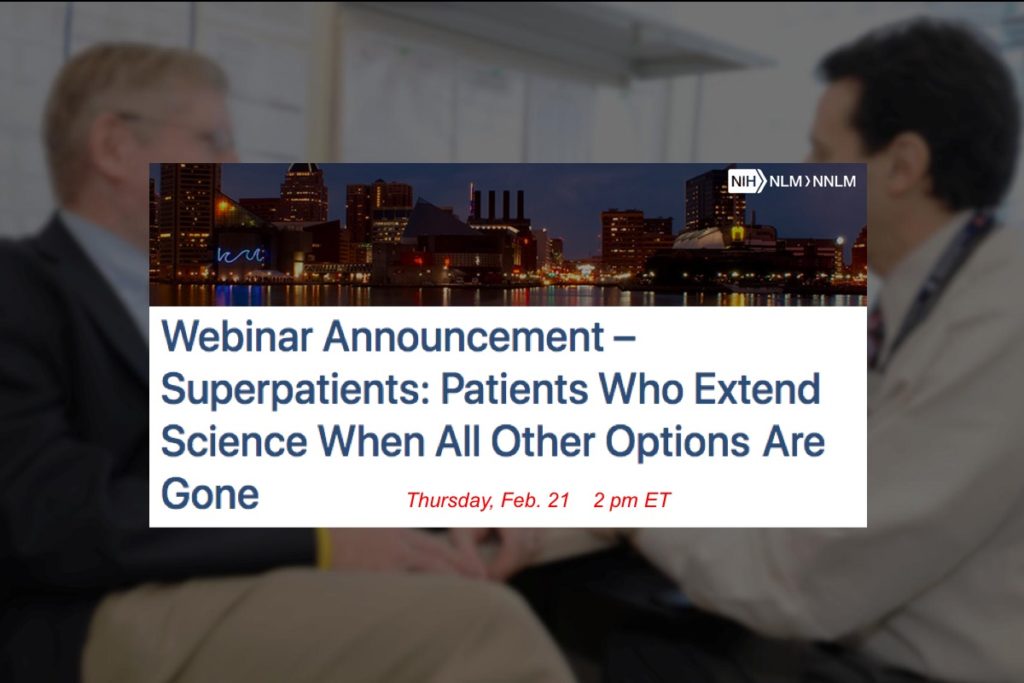Update: here’s the archive recording of the webinar.
Original post:
Tomorrow (Thursday Feb 21) at 2pm ET, for the second time I’ll be presenting the concept for my new book, Superpatients: Patients who extend science when all other options are gone. The first time was December, in a private webinar for the QI [quality improvement] Connect team in Scotland. Registration is open to the public here but that’s optional – at bottom I’ll paste in how you can join it at showtime, without registration. In any case it’s free and no obligation.

This one’s to NNLM – the National Network of Libraries of Medicine. Medical librarians (“medlibs”) have always been a magical resource, to me, because in addition to helping researchers and medicos, they can help ordinary people dig up information they need but don’t know where to find. It’s truly empowering.
It’s no coincidence that the opening anecdote of the e-Patient White Paper is the story of a man who got busted by hospital security (!!) for impersonating his own doctor at their medical library. What was his crime? He was about to have surgery, and he wanted to see the only article about it!
That anecdote happened in 1994, at the dawn of the Web. Today, 25 years later, oh how the world has changed. Empowered patients certainly don’t reliably have everything they need, but a large part of the crotchety “none of your business” population has retired or died, and some kids born that year (digital natives) are about to become MDs.
e-Patients vs Superpatients: Citizen Science
In my 2007 cancer case, I was an e-patient (empowered, engaged, etc.) though I didn’t know it had a name. E-patients are involved, not passive … while sick I hunted (with my doctor’s help) for information on how to survive the nasty side effects of the treatment I would get. I dug up existing information, as many e-patients do, thereby helping healthcare achieve its potential.
More recently I’ve discovered that some patients have gone WAY beyond digging up existing info: when doctors say “There’s nothing more we can do for you: we’re out of ideas,” they keep pushing, digging, and sometimes they discover new things, real true new knowledge, even though they’re not trained as scientists.
But they are acting as scientists – creating new knowledge, and sometimes even new treatments(!). Wired magazine had a feature article about them – in 2001:
The Citizen Scientists
United by the Net and emboldened by their numbers, parents of desperately ill children are funneling millions into research, building vast genetic databases, and rewriting the rules of the medical industry. …
I call this new generation of knowledge-creators “Superpatients.” I’ve had the thrill of meeting some of them, and have talked with more. In this webinar I’ll introduce the concept and present a glimpse of some of their stories. Join us if you can; if you miss it, the archive will be available later. (But honestly, archives get far less viewing later, because life goes on. So really, try to be online if you can.)
BONUS DISCOVERY: today I learned that this year NNLM has a new initiative to support citizen science. How perfect! I’m hoping we can turn this into an ongoing conversation, to “marry” the needs of superpatient families with the knowledge and services that medlibs provide.
How to join without registering
To Join the Training Session
1. Go to https://nih.webex.com/nih/k2/j.php?MTID=t8e44fadedc14666e3f432c0d84c03ef2
2. Enter your name and email address.
3. Enter the session password: nnlm.
4. Click “Join Now”.
5. Follow the instructions that appear on your screen.
To view in other time zones or languages, please click this link.
To Join the Session by Phone Only
To receive a call back, provide your phone number when you join the training session, or call the number below and enter the access code.
- Call-in toll number (US/Canada):1-650-479-3208. (Or, global call-in numbers)
- Access code: 623 111 231
To add this session to your calendar program (for example Microsoft Outlook), click this link.
Need technical assistance using WebEx? Visit WebEx Help.


[…] This is my second speech to the National Network of Libraries of Medicines. As I said in announcing the first one, […]